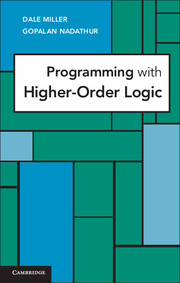
-
Select format
-
- Publisher:
- Cambridge University Press
- Publication date:
- 05 August 2012
- 11 June 2012
- ISBN:
- 9781139021326
- 9780521879408
- Dimensions:
- (228 x 152 mm)
- Weight & Pages:
- 0.55kg, 320 Pages
- Dimensions:
- Weight & Pages:
You may already have access via personal or institutional login
Book description
Formal systems that describe computations over syntactic structures occur frequently in computer science. Logic programming provides a natural framework for encoding and animating such systems. However, these systems often embody variable binding, a notion that must be treated carefully at a computational level. This book aims to show that a programming language based on a simply typed version of higher-order logic provides an elegant, declarative means for providing such a treatment. Three broad topics are covered in pursuit of this goal. First, a proof-theoretic framework that supports a general view of logic programming is identified. Second, an actual language called λProlog is developed by applying this view to higher-order logic. Finally, a methodology for programming with specifications is exposed by showing how several computations over formal objects such as logical formulas, functional programs, and λ-terms and π-calculus expressions can be encoded in λProlog.
Reviews
'… I am impressed with the depth of the discussion and the clearly well-produced book. The authors have argued successfully for the power and versatility of the fundamental ideas underlying λProlog.'
Sara Kalvala Source: Computing Reviews
Contents
Metrics
Altmetric attention score
Full text views
Full text views help Loading metrics...
Loading metrics...
* Views captured on Cambridge Core between #date#. This data will be updated every 24 hours.
Usage data cannot currently be displayed.
Accessibility standard: Unknown
Why this information is here
This section outlines the accessibility features of this content - including support for screen readers, full keyboard navigation and high-contrast display options. This may not be relevant for you.
Accessibility Information
Accessibility compliance for the PDF of this book is currently unknown and may be updated in the future.


